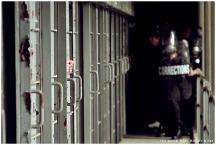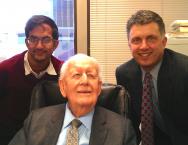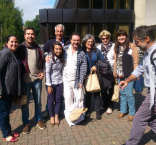 |
Prisons in the United States: Inmates, Policies, and Profits In October 2015, a program crafted by the independent U.S. Sentencing Commission allowed about 6,114 federal prisoners convicted of drug trafficking early release, reducing their sentences reduced by a ‘minus two’ recalibration of the Drug Quantity Table used to determine offense level. Another 8,500 prisoners may be released by November 2016, and over time a total of 46,000 federal prisoners could benefit from sentencing adjustments. |
 |
The Politics of Victimhood in Conflict ResolutionOn November 6, 2015, Dr. Sara Cobb and the Center for Narrative and Conflict Resolution hosted a conference on “The Politics of Victimhood in Conflict Resolution.” The event served as a space for scholars and practitioners to raise important questions regarding how we think about and categorize victims and perpetrators within a conflict context. The keynote speech was delivered by Diane Enns, with John Winslade as the discussant. Conference presentations were organized into five panels, each panel raising a different set of critical questions about the binary classification of victims and perpetrators. Each panel was followed by a... |
 |
From Counter-Narrative to New Multi-Track DiplomacyNames like “John Burton,” “Joseph Montville,” “Harold Saunders,” and “John W. McDonald” will probably ring a bell if you are associated with George Mason University’s School for Conflict Analysis and Resolution (S-CAR). These are some of the founders of the field of Track II diplomacy, i.e., non-governmental, informal and unofficial dealmaking between actors of different States regarding matters of public concern. In the early 1990s, the term “Multi-Track Diplomacy” was coined by Louise Diamond and Ambassador (ret.) John McDonald to describe a systems-based... |
|
|
Association for Conflict Resolution: October 6-10, 2015With the help of S-CAR and George Mason University, I was fortunate to have the opportunity to attend this year's annual conference of the Association for Conflict Resolution (ACR). The conference is an opportunity for conflict resolution practitioners, especially North American mediators to exchange innovative ideas in the field and build relationships. This year's conference drew approximately 300 participants around the theme of "Thinking about our Thinking" emphasizing workshops and presentations based on empirical studies or evidence based practices. It was a good chance for me and other academics to introduce research to a community of practitioners. In collaboration with Dr. Susan Allen and a mediator colleague, Dan Bernstein, I developed a three-hour workshop session called "Tools to Prove you Practice what you Preach." The title was in part... |
 |
Retirement Celebration for Sandra Cheldelin: A Fire that Kindled Other Fires at S-CAR and Beyond Voltaire once said "Appreciation is a wonderful thing: It makes what is excellent in others belong to us as well." Voltaire's words have always had a profound effect on me, but they held a new meaning on the evening of November 11, 2015, when the S-CAR community, friends, and loved ones, gathered for what proved to be a very joyful retirement celebration for Sandra Cheldelin. |
|
|
Nicole Pearson, S-CAR Undergrad StudentIn fall 2014, Nicole Pearson moved to the Washington, D.C. area from Bucks County, Pennsylvania, to study conflict analysis and resolution at Mason. “I knew this was something I would love to get a degree in as I had always considered myself to be a healer and problem solver.” Since then, she has been enjoying her academic life and has come to learn about herself and from people she has encountered. Nicole, who says she suffers from “wanderlust,” loves to travel and desires to see the world and experience different cultures. Although she admitted that she had not seen as much of... |
 |
Amanda Rauh, Malta Dual Degree Student Amanda Rauh who is currently pursuing a dual degree program in Malta, moved to the Washington, D.C. metropolitan area from Oklahoma City to prepare for her first course at S-CAR, in spring 2015. |
 |
From Dictatorship to Democracy: Transitional Justice in Chile On October 5, 2015, Chile commemorated 25 years since its return to democracy after the violent and repressive dictatorship headed by Augusto Pinochet. Although Chile has adopted some transitional justice measures to address the gross human rights violations committed during the dictatorship, there is still work to be done in order to bring truth and justice to the victims and the society as a whole. |



